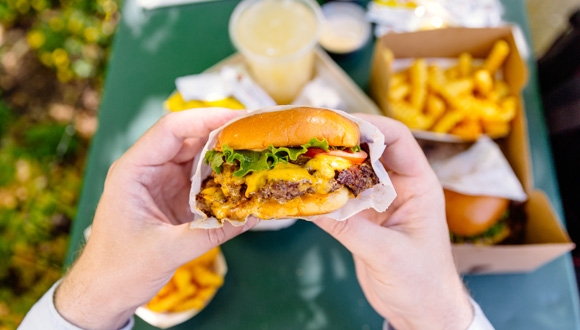There's nothing like a long holiday weekend to ignore those healthy habits you're usually so good about following.
But, several greasy meals and spiked seltzers later, reality hits. The weekend is over and you feel...saturated, for lack of a better word. Your body feels like it's in need of a detox.
Given your current state of affairs, you may be thinking: Is a detox diet what I need right now?
"Browse social media or the internet, and you'll find tons of different, and often even conflicting, detox diets," says Amanda Beaver, wellness dietitian at Houston Methodist. "These diets can last anywhere from a day to an entire month, with the idea being to give your gut and liver a rest by taking a break from additives and preservatives."
While this premise may sound appealing, Beaver warns that it's flawed and potentially harmful for your health.
After a weekend of overindulging, here are three things Beaver wants you to know before trying a detox diet:
Our bodies are naturally detoxing all the time
When we think about detoxing, we probably think about lemon water, fasting and supplements.
But, when scientists refer to detoxing, they're talking about the natural detoxification systems our bodies use to get rid of the toxins we're exposed to from things like air pollution, heavy metals (including mercury and lead), car exhaust, pesticides and alcohol.
"We actually have specialized enzymes in our liver that our bodies use to combat these toxins," explains Beaver. "Then, our body eliminates these products via our urine, stool and sweat."
The ability to naturally detoxify varies from person to person because it's influenced by several different factors, including your:
- Health status
- Diet
- Lifestyle
- Genetics
"The theory behind detox diets is that some people may need additional support for their body's natural detoxification pathways, but we still don't know whether this is actually true or not," says Beaver. "In the meantime, detox diets may be more harmful than helpful."
Detox diets can be dangerous
First thing's first, there's no scientific evidence that a detox diet actually helps your body eliminate toxins.
Plus, there are downsides to these diets, including:
- A dramatic reduction in your fiber intake. Most detox diets consist of juice cleanses, but juice contains very little of the fiber found in whole fruits and vegetables. Because one of the ways your body eliminates toxins is via your stool, eliminating almost all the fiber from your diet (which aids bowel movements) would be an enormous disservice to, and could even impede, your body's natural detox pathways.
- A lack of important nutrients. Most detox diets are severely lacking in protein and many B vitamins. Aside from the important roles these nutrients play in your overall nutrition, many enzymes require these nutrients to naturally detoxify your body.
- An unhealthy reduction of calories. Detox diets are typically very low in calories. Severely limiting your calorie intake for an extended period of time can slow your metabolism, causing fatigue and even compromising your immune system.
Lastly, Beaver adds that detox diets can become downright dangerous.
"Detox diets can cause big fluctuations in blood sugar, which can be dangerous for people with diabetes," Beaver adds. "In addition, the high sugar content in some of these diets can lead to diarrhea, and severely limiting calories for an extended period of time can affect a woman's menstrual cycle and bone health."
A detox diet won't help after a weekend of binge-eating or drinking
After a weekend spent drinking and eating fatty, greasy meals, we may feel like our bodies need to detox — and what better way to reset than with loads of juiced fruits and veggies, right? Maybe not.
"Juices are typically very low in protein, complex carbohydrates and B vitamins — three nutrients our bodies need after we've had a lot of alcohol," explains Beaver.
Instead of turning to a juice cleanse or some other detox diet, Beaver recommends providing the nutrients your body needs to recover.
"First and foremost, you can support your body's recovery after drinking by hydrating," says Beaver. "Then, opt for a well-balanced meal with a good source of protein, whole veggies and/or fruits and a nutrient-rich carbohydrate."
Beaver recommends a recovery meal that contains the following:
- A good protein source, such as eggs, yogurt or tofu scramble
- Plenty of whole veggies and/or fruits, including sautéed spinach, peppers, berries, apple slices or frozen fruit
- A nutrient-rich carbohydrate, like seeded bread, oatmeal or sweet potato


